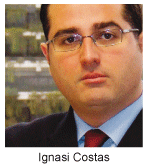Spain confirms user-generated IP rights – Osborne Clarke
The recent Spanish Telecinco-YouTube judgment is significant as it confirms the dominant business model used by service providers where users play an important role as creators of content, says Judit Barnola, a technology lawyer with Osborne Clarke in Barcelona.
La reciente sentencia sobre el caso Telecinco-YouTube es importante ya que confirma un modelo de negocio dominante entre los ISP, en el que los usuarios juegan un papel fundamental como creadores de contenido, afirma Judit Bartola, abogada de Osborne Clarke en Barcelona.
The Commercial Court has ruled in favour of YouTube, arguing that it is not a content provider and not liable to carry out the prior control of all videos users upload. “This puts the obligation firmly on intellectual property (IP) rights holders to police the use of their own materials.”
The case relates to an action brought by Spanish media company Telecinco against YouTube for hosting video files in which it holds IP rights. At issue was whether YouTube was a content provider or “intermediary service provider”.
The question is important, she says, as content providers must control in advance the legality of the media they use, while the judgment may now be applied to other services such as social networking sites, wikis or blogs.
“Intermediary service providers are not liable for the information stored on condition that they do not have actual knowledge that it is illegal, or if they act expeditiously in removing materials, which, in this case, YouTube did.”
In Spain, “actual knowledge” only occurs if a court orders the removal of material. So the only obligation on intermediary service providers is to collaborate with IP rights owners to remove infringing material, once identified.
“The ruling confirms what is already established in the Spanish Electronic Commerce Law and Directive on Electronic Commerce, that it is not possible to impose general obligations on intermediary service providers to supervise the information they store or transmit,” says Barnola.
Copyright owners must therefore protect and monitor the use of their own protected content, and notify service providers of any potential infringements by asking them to remove material they allege violates their rights.
“The ruling brings Spain into line with findings elsewhere, including the US, and means that IP rights holders need to continue to make a major effort to track and control all their content across internet networks, in order to monitor whether their rights are being infringed.”












